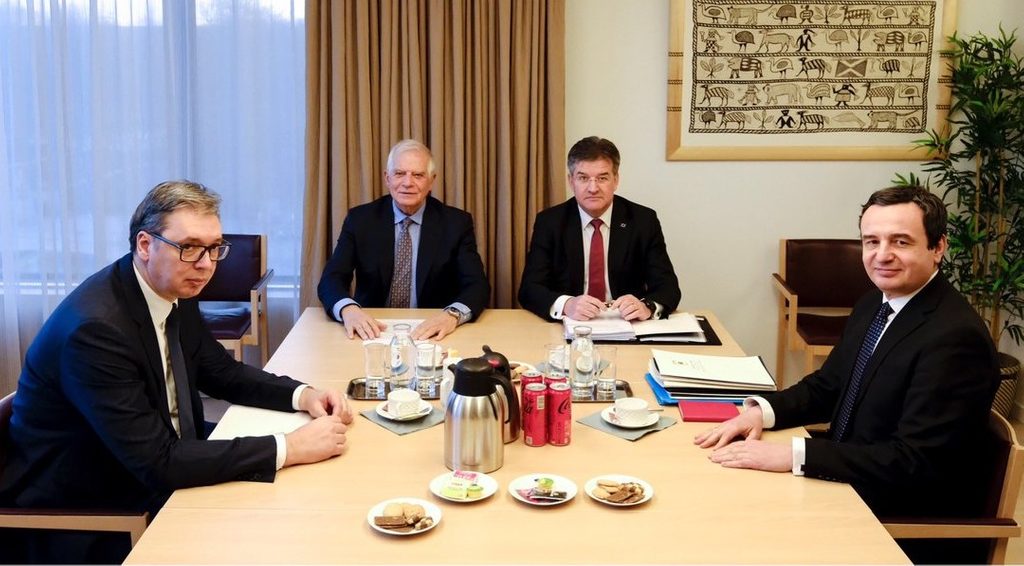The normalisation process between Serbia and Kosovo which was agreed half a year ago has stalled over differences about local self-government for the Serb majority municipalities in north Kosovo.
As previously reported, the latest EU-facilitated high-level meeting in Brussels between the leaders of the two countries failed to bridge the differences between them. The meeting was followed by a statement by High Representative Josep Borrell on behalf of the EU in which he accused them of violating their dialogue obligations and the normalisation agreement to which they had agreed.
The main sticking point which has derailed the process is the issue relating to the establishment of an Association/ Community of Serb Majority Municipalities. Already the double label of the issue, Association/Community, reflects the different expectations of the two parties.
In Kosovo’s view, an Association would have limited competencies and mainly represent the Serb municipalities and their interests, without changing the governance system regulating the relations between central and local levels. A Community, in Serbia’s view, might refer to an ethnic minority which collective rights.
The normalisation agreement (article 7) does not specify which view is correct. It refers to the European Charter of Local Self-Government, adopted by the Council of Europe, and European practice.
In the agreement, both parties committed to ensure an “appropriate level of self-management for the Serbian community in Kosovo and ability for service provision in specific areas, including the possibility for financial support by Serbia and a direct communication channel for the Serbian community to the Government of Kosovo”.
But as always, the devil is in the details. It becomes even more complicated because of the timing of the different articles and steps in the agreement. According to the annex of the agreement, Kosovo and Serbia agreed that all articles will be implemented independently of each other but starting “immediately” with negotiations on the arrangements for local self-management.
The former High-Representative, Federica Mogherini, tried to clarify the issue in a letter which she sent to Kosovo already in 2015 at the start of the Belgrade-Pristina dialogue. In the letter, she wrote that it was “the EU’s understanding that the Association/Community – following the First Agreement and Kosovo Law – will not constitute a third level of government and will not have executive powers”.
Asked about the letter at the Commission’s press conference last Thursday, Peter Stano, EU’s lead spokesperson for foreign affairs, declined to confirm if it was still EU’s position. He explained that it is up to Serbia and Kosovo to sort out their differences and agree on how to implement the article.
"It was clear right from the start of the follow-up of the implementation of the agreement that sequencing is the top priority,” an expert on the Western Balkans and the enlargement process told The Brussels Times on the condition of anonymity. “Both Serbia and Kosovo need to implement each a major issue of the agreement at about the same time.”
This is where things become very demanding and where the EU as facilitator plays an important role because there are no timelines or any further details in the agreement itself, he explains. The process will only work if all steps are face-saving for both sides. This requires very skilled and hands-on mediation by the EU team.
“To skillfully steer the Belgrade-Pristina dialogue and the implementation of the agreement is the greatest challenge EU diplomacy has ever faced. The first crisis is there already and there will be more of the same. But if the EU team keeps a cool head and insists on solid speaking-terms with both sides, there can be a successful outcome.”
He thinks that it should be possible to agree about local self-government concerning education, health care, urban and rural planning, and local economic development. These are functions that have been delegated to the local level and for which all municipalities in Kosovo are responsible. Such a structure would also be in line with the ruling of the Kosovo Constitutional Court.
“In parallel, to satisfy a major interest of Kosovo, there must be tangible progress on the establishment of permanent missions at the respective government seats. This is also part of the agreement and a further step in the consolidation of Kosovo's statehood whilst avoiding formal recognition by Serbia,” according to the expert.
In his latest statement, High Representative Josep Borrell underlined that the implementation of the Association/Community needs to start without any further delay or pre-condition. But the two parties are required to implement their obligations “expediently and in good faith”. While the dialogue should lead to the recognition of Kosovo, the two countries are required to exchange “permanent missions” (diplomatic representations), the sooner the better.
M. Apelblat
The Brussels Times

